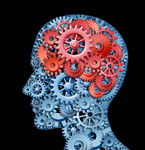Finding of disrupted brain gene orchestration gives first direct evidence of circadian rhythm changes in depressed brains, opens door to better treatment
May 13, 2013
 Every cell in our bodies runs on a 24-hour clock, tuned to the night-day, light-dark cycles that have ruled us since the dawn of humanity. The brain acts as timekeeper, keeping the cellular clock in sync with the outside world so that it can govern our appetites, sleep, moods and much more.
Every cell in our bodies runs on a 24-hour clock, tuned to the night-day, light-dark cycles that have ruled us since the dawn of humanity. The brain acts as timekeeper, keeping the cellular clock in sync with the outside world so that it can govern our appetites, sleep, moods and much more.
But new research shows that the clock may be broken in the brains of people with depression — even at the level of the gene activity inside their brain cells.
It’s the first direct evidence of altered circadian rhythms in the brain of people with depression, and shows that they operate out of sync with the usual ingrained daily cycle. The findings, in the Proceedings of the National Academy of Sciences, come from scientists from the University of Michigan Medical School and other institutions.
Read the full article at UofMHealth.org »
Read the publication abstract at PNAS »

